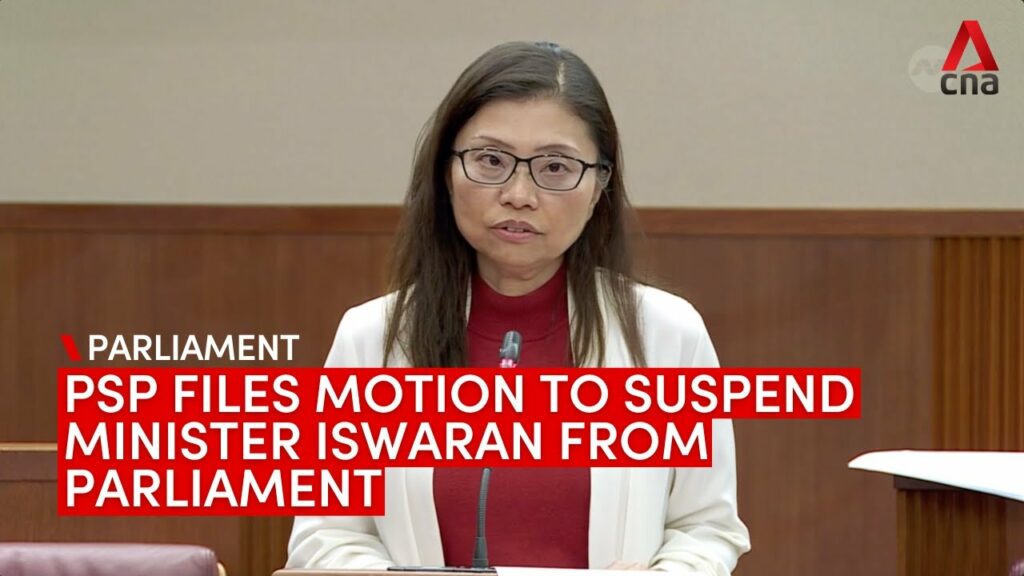Mr. Speaker Sir,
I beg to move, “That this House suspends Mr S Iswaran from the service of Parliament for the remainder of the current session of the 14th Parliament.”
As the House has passed a Business Motion to rearrange business such that my motion for leave to bring in a Private Member’s Bill will be taken after the simultaneous debate on my motion and the motion by the Leader of the House, I would like to first provide some background on the motion statement as it appears today, as well as my Private Member’s Bill.
We had originally wanted the motion statement to state that the suspension would to be (i) until Minister Iswaran has been cleared of all wrongdoing and he is able to resume duties or (ii) until the end of the current session of the 14th Parliament, whichever is earlier. We were however advised by Parliamentary staff that the first condition is not sufficiently definite and thus cannot form part of the motion statement. It was therefore removed.
We had also originally wanted the motion statement to include the provision that should Minister Iswaran be cleared of all wrongdoing, the MP allowance not paid over the duration of the suspension should then be paid to him. We were informed that this also cannot form part of the motion statement because currently, the law does not allow that to be done. If we wish to back-pay Minister Iswaran, legislative changes would have to be made. This is why we have also asked for leave to introduce a bill to make that possible. The main goal of my Private Member’s Bill is to empower Parliament to authorise the back-payment of the allowance of an MP who has been suspended from the service of Parliament by resolution.
Thus, the motion statement stands as it is today.
Sir, I regret the circumstances that have led us to debate this motion. This is the first time since independence that such a motion has been moved in this House.
My colleague Mr Leong Mun Wai and I have placed this motion before the House after serious consideration. This is not a case of “anything you can do, I can do stronger”, as the Prime Minister said during the sitting on 2 August.
Since 12 July, Minister S Iswaran has been instructed by the Prime Minister to take a leave of absence from his official duties until the Corrupt Practices Investigation Bureau completes its investigations into him. As the Prime Minister informed this House on 2 August, while Minister Iswaran is interdicted from his ministerial duties, he will draw a reduced pay of $8,500 per month. However, Minister Iswaran continues to draw his full MP allowance of $192,500 per year. The Prime Minister said that it was not within his discretion to cut the MP allowance. To do that, it must be done through a motion in Parliament to suspend the Member from the service of Parliament.
Hence, PSP decided to file the motion to suspend Minister Iswaran.
How is this case different from others as to warrant a suspension?
Firstly, he is no longer performing his duties as a Member of Parliament, whether in Parliament or in the constituency. The Prime Minister has made the decision to place Minister Iswaran on leave of absence in both his capacity as Minister as well as MP. While we do not have the details of the investigation that the Prime Minister is privy to, we believe the Prime Minister must have good reasons to do so. So, in effect, Minister Iswaran has been fully suspended from his MP duties, but not from his MP allowance.
Secondly, this case involves corruption, a crime we have always maintained we have zero tolerance for. We believe this merits a strong statement that reflects our values. In addition, for many years, the Government has justified the high salaries for political office holders on the basis of ensuring that our government remains honest and free of corruption. This is why many Singaporeans, including myself, find it difficult to accept that taxpayers’ money is being used in this way.
Let us set aside this particular case involving Minister Iswaran for the time being, and instead consider a generic case of corruption.
Should we have a system that allows an outcome whereby an MP, who is eventually found guilty of corruption and whose duties had been suspended, can continue to receive in full his or her MP allowance over the entire duration of investigation plus the duration of court proceedings until he or she is finally pronounced guilty and all avenues of appeal exhausted? Is this a good use of tax revenue? Isn’t this a drain on our resources? If this is not a desirable outcome, then we need to do something.
This motion is about prudent use of taxpayer’s money, NOT a presumption of guilt.
While we do not want corrupt MPs to benefit financially, we must balance that with ensuring that innocent MPs do not have to pay a price for accusations or suspicions that later proved unfounded. To do that, we have two options:
The first is to pay the allowance first and then clawback if found guilty.
The second is to suspend the allowance first and then pay back if found innocent.
Both of these options are currently not legal. Existing laws do not allow any clawback of allowance nor paying back of withheld allowance. Legislative changes are necessary to adopt either one.
Under the first option of pay-first-clawback-later, a potential problem exist. After the payment of the allowance, we have no control over where the money flows. There might be difficulties later in recovering the sum of money, and time, effort and costs may be incurred in the recovery.
Hence we prefer the second option of suspend-first-pay-later.
It is the PSP’s stance that an MP or minister who is under investigation for corruption and suspended from official duties should be put on no pay leave until the investigation or criminal case is concluded. If the MP or minister subsequently resumes their official duties after being cleared by the investigation or criminal case, they should be entitled to full back-pay for the period during which they were on leave of absence.
Now, the Leader of the House has also filed a motion today. There are three parts to the motion, which I will deal with in turn.
Clause (a) of the Leader’s motion asks the House to affirm the need for Members of Parliament to uphold the highest standards of integrity and conduct themselves in accordance with the law. PSP has no objection to this. We are also of the belief that MPs have a responsibility to be men and women of integrity and to act in accordance with the law. That is our duty to Singaporeans and what Singaporeans expect of us.
Clause (b) of the Leader’s motion asks the House to affirm the need to deal firmly and fairly with any Member of Parliament who is being investigated for possible wrongdoing. In principle, PSP has no objections to this. However, we may differ on what constitutes “firmly and fairly”.
We are not advocating that any MP who is under investigation should be suspended. That would indeed be unfair and setting the bar too low. Anyone can lodge a complaint and an investigation would be triggered. Out of the many cases investigated, a much smaller number would result in an arrest, as had happened with Minister Iswaran.
We do however maintain that an MP or minister who is under investigation for corruption and suspended from official duties should be put on no pay leave until the investigation or criminal case is concluded, and will only receive back pay if they are subsequently cleared by the investigation or criminal case.
Clause (c) of the Leader’s motion asks the House to resolve to consider the matter regarding Minister Iswaran when the outcome of the ongoing investigation against him is known. In effect, it is asking the House to maintain the status quo, where Minister Iswaran continues to draw his MP’s allowance until the investigations against him are completed.
This is unacceptable to the PSP. It is unclear how long the investigations will take. We have seen that corruption investigations can take a long time especially when it involves overseas participants. In 2017, Keppel O & M admitted to corruption to US Department of Justice. In December 2017, Keppel O & M was served a conditional warning in lieu of prosecution by the CPIB, with investigations continuing into the KOM executives involved. The CPIB investigations only concluded more than 5 years later, in January 2023, with a stern warning to the KOM executives.
If we do not suspend Minister Iswaran, and he is subsequently charged and found guilty of corruption, we would not be able to recover the allowances that were paid to him while he was under investigation and not performing his duties.
There have been precedents of MPs who have remained an MP and continued to draw the full MP’s allowance throughout the entire legal process while they were charged for corruption, until they chose to resign or were otherwise disqualified from office. This was the case with former PAP MP and Minister of State Wee Toon Boon in the 1970s, who remained an MP throughout his trial for corruption. He was charged in Apr 1975 for corruption. He remained an MP for another 1 year 5 months until September 1976 when he resigned. By the time he resigned as an MP, he had already served 2 months of his 18-month jail term.
PSP believes that it would be a most unsatisfactory situation if this were to happen in the case of Minister Iswaran. Given that Minister Iswaran is, one, under investigation for corruption, two, placed under arrest and three, put on leave of absence by the Prime Minister, we believe that these 3 factors together make a strong case for his suspension from Parliament.
That is why today, I have moved this motion and sought leave to table a Private Member’s Bill to amend the Parliament (Privileges, Immunities and Powers) Act in order to create the legal mechanisms to back-pay an MP their allowance if they are suspended.
PSP believes that the suspension together with the provision to back-pay him should he be cleared of all wrongdoing IS indeed dealing with the matter firmly and fairly.
The motion moved by the Leader of the House does not achieve this and it is in effect calling for a maintenance of the status quo.
Let us compare the financial outcome of suspending Minister Iswaran vs not suspending, under 2 different scenarios of him being innocent or guilty.
If Minister Iswaran is innocent, there is no difference in outcome between suspending or not suspending him.
Innocent |
||
|
Not suspended |
Suspended |
|
|
Minister Iswaran |
No loss |
No loss due to back pay |
|
Taxpayers |
No loss |
No loss |
However, if Minister Iswaran is found guilty, there is a distinct difference. If he is not suspended from Parliament, he will gain the MP allowance while taxpayers lose tax revenue. If he is suspended, he loses the allowance while taxpayers save on tax revenue.
Guilty |
||
|
Not suspended |
Suspended |
|
|
Minister Iswaran |
Gain allowance |
Lose allowance |
|
Taxpayers |
Lose tax revenue |
Save tax revenue |
This clearly shows that suspending leads to a more desirable outcome financially.
Therefore, if the House is to vote on the motion as a whole, PSP will be voting against the motion moved by the Leader.
I hope all Members will support the motion moved by Mr Leong Mun Wai and I.
Thank you.

